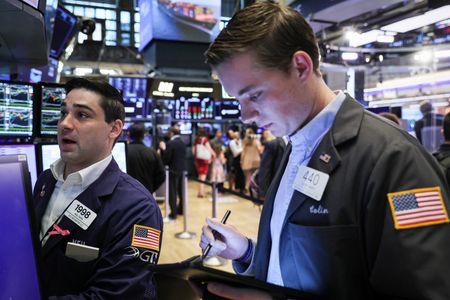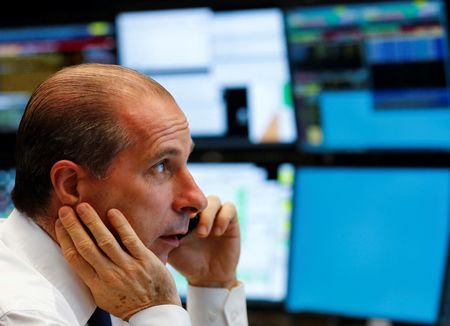


By Chris Prentice and Alun John
NEW YORK/LONDON (Reuters) -Global equities retreated and benchmark U.S. Treasury yields eased off two-month highs on Tuesday as talks over the U.S. debt ceiling continued without resolution.
Hawkish comments from Federal Reserve officials about the possibility of further rate hikes sent the U.S. dollar to a two-month high.
Oil futures extended their rally.
Aides for President Joe Biden and Republican House of Representatives Speaker Kevin McCarthy, convened again after the two leaders failed to reach an agreement on Monday on how to raise the U.S. government’s $31.4 trillion debt ceiling. The nation is facing the risk of default in as soon as nine days.
“A lot of investors are fixated on the debt ceiling talks. If this deal starts to become more elusive, we could start to see more market stress but there is still optimism something will get done,” said Edward Moya, senior market analyst at OANDA in New York.
The MSCI world equity index, which tracks shares in 49 nations, fell 0.96%.
The Dow Jones Industrial Average fell 231.07 points, or 0.69%, to 33,055.51, the S&P 500 lost 47.05 points, or 1.12%, to 4,145.58 and the Nasdaq Composite fell 160.53 points, or 1.26%, to 12,560.25.
U.S. business activity rose to a 13-month high in May, lifted by strong growth in the services sector, an S&P Global survey showed.
The pan-European STOXX 600 index closed down 0.6%, its steepest one-day percentage fall in three weeks. The STOXX Europe Luxury 10 logged its largest daily decline since mid-December, as investors took profit after a stellar run for the sector amid signs of weakening demand in United States.
Activity data that showed euro zone business growth remained resilient, if a touch softer than expected.
Julius Baer’s shares fell over 7% after the Swiss wealth manager reported modest money inflows in the first four months, disappointing investors who had expected it to benefit from Credit Suisse’s troubles.
“Without real action on (the debt ceiling front), hawkish Fed speak has (had) some sway on markets,” Mizuho economist Vishnu Varathan said, adding that some pressure on U.S. Treasuries has also lent support to the dollar.
Minneapolis Federal Reserve President Neel Kashkari said on Monday that it was a “close call” as to whether he would vote to hike again or pause at next month’s meeting, and St. Louis Fed President James Bullard said another 50 basis points of hikes might be required.
The comments caused traders to push back expectations for U.S. rate cuts from July toward November or December.
Benchmark 10-year U.S. Treasury yields edged down from two-month highs reached earlier in the session, while yields on one-month bills fell back from a record high. [US/]
The yen fell 0.04% against the dollar.
“The (Bank of Japan’s) ongoing reluctance to tighten monetary policy further in the near-term combined with a recent adjustment higher in US rates has triggered renewed upward momentum for (the dollar versus the yen),” said MUFG senior currency analyst Lee Hardman in a morning note to clients.
The dollar index, which tracks the greenback against a basket of six currencies, gained 0.34 point, or 0.33%, to 103.54.
Spot gold prices reversed earlier losses and was up 0.26% to $1,974.59 an ounce by 4:27 p.m. EDT (2027 GMT). Gold futures settled down 0.14% at $1,974.50.
Elsewhere in commodities, oil prices gained on a tighter gasoline market outlook and a warning from the Saudi energy minister to speculators. [O/R]
Brent crude futures rose 1.1% to settle at $76.84 a barrel, and U.S. crude prices finished up 1.2% at $72.91.
(Reporting by Tom Westbrook in Singapore, Kane Wu in Hong Kong, and Alun John in London Editing by Bernadette Baum and Lisa Shumaker)
